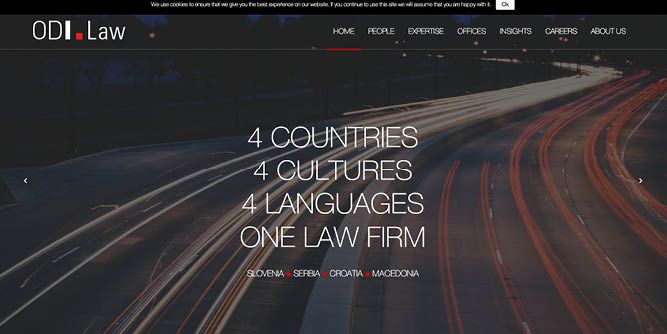In “The Buzz” we offer our readers in each issue a short summary of the major and relevant topics of interest in Central and Eastern Europe, provided by those best positioned to know: law firm partners and legal journalists/commentators on the ground in each CEE country.
Austria
“Moving on, cleaning up, and trickling down”
One of the growing trends in the Austrian market is that of younger partners leaving renowned larger firms to establish their own boutiques. This is not a new phenomenon, according to Martin Eckel, Partner and CEE Head of Competition, EU & Trade at TaylorWessing e|n|w|c, rather something that has been increasing over the last 2-3 years. Eckel pointed out that it tends to happen most often within arbitration practices, with both Schoenherr and Wolf Theiss registering recent departures. Eckel further explained that it makes sense for arbitration to be the main practice area of spin-offs due to the increased potential conflicts of interest in a large firm. Departures, of course, are not limited to that practice area, however, as two lawyers left TaylorWessing in August to launch their own IP/IT boutique (named “Geistwert” – tr. “BrainValue”).
In terms of buzzing client work, nationalized Hypo Alpe Adria is likely at the top of most lawyers’ list. All starting with a set of guarantees for Hypo’s liabilities made by the Carinthia Province, the bank’s series of refinancing needs has created a scenario where, because Austrian political sentiment precludes the bank from going bankrupt and has resulted in legislation effectively voiding certain liabilities of the bank and the underlying guarantees by Carinthia, many investors stand to lose a huge part of their investments. This has sent, according to Eckel, a “huge shockwave for investors, in particular in the case of large insurance companies,” which are now engaging lawyers, not only from law firms – though many of them in the country have some form of a mandate related to this – but also from academia to help draft opinion statements to see whether claims against the state can be brought. (For more on this subject see page 45)
Lastly, compliance focus is a growing trend in Austria (as it is across CEE). Due to the increased level of fines, and because of the double level of liability towards fines in cartel cases (at both European and country levels), Eckel points to a trickle down in compliance focus beyond the traditionally heavily regulated sectors like life sciences and finance, as developments like the Bribery Acts – both the UK and Austrian – still resonate within the market.
Bosnia and Herzegovina
“Exciting internationally funded projects in an otherwise relatively small market”
PPP/Infrastructure work has the Bosnian market excited, especially due to the legislative reforms meant to facilitate such projects, according to Emina Saracevic, Managing Partner at Saracevic & Gazibegovic Lawyers. Following up on the BH Law on Public Procurement introduced in May 2014 (to be implemented in November 2014), which aims to synchronize the country’s approach in the field to EU directives and which facilitated access to the market to foreign investors, the Federation part of the country now has a new Company Law in parliamentary proceedings. Saracevic explained that the new law will reduce the minimum start-up capital for limited-liability companies and reaffirm the principle of allowing foreign companies to open up local branches instead of forcing them to set up a business entity. The country is also aiming to improve its investment climate with a new piece of anti-corruption legislation adopted in 2014.
At the same time, the last months have seen the opening of a central portion of the new Corridor 5C road network, which – at a value of EUR 310 million (excluding VAT) – will add to the current total of 124 km of highway. Another exciting move in the market follows the recent Agrokor expansion (which made it the largest retailer in the country), as the local retailer Bingo seems set to compete in acquisitions and is already in negotiations to purchase Interex, part of the Intermarche Group, in the country. If these deals go through and receive relevant competition clearances, Bingo will become the second largest retailer in the country.
International funding has also sparked other projects that are keeping lawyers busy, ranging from the latest EUR 785 million Tuzla TPP project (financed by Chinese investors), an ongoing EUR 600 million Stanari TPP plant (being built by China’s Dongfang Electric Corporation and financed by EFT Group), as well as major construction work in Sarajevo (financed by investors from the Middle East), which will add an additional 69,000 square meters of shopping/business/hotel space in the capital and create one of the largest video billboards in Europe.
Things stand to pick up even further in the market after the general elections on October 12, with the opposing parties pushing for different privatizations relevant to railways, telecom, and energy sectors.
Czech Republic
“Too many departures to not raise questions”
The primary subject that lawyers in the Czech market that we spoke to brought up was the perceived outflow of lawyers from the White & Case office in Prague. While the office is still very active on big-ticket deals (the last one reported on the CEE Legal Matters website, on September 16, involved the sale of an international property portfolio), the firm has had a number of notable departures since the beginning of the year, including Partners Jiri Tomola and Ladislav Smejkal in September, Ivo Barta in August (joining fellow White & Case alumni Jakub Dostal and Petr Kuhn, who had left the firm at the beginning of the year), and the firm’s highly-regarded Chief Operating Officer for Central & Eastern Europe and EMEA Director of Strategic Projects, Richard Singer. As this issue went to print, White & Case lawyer Ivo Janda, was made partner in the Prague office. Nonetheless, in light of the recent withdrawals of two international firms – Norton Rose and Hogan Lovells – from the market, the buzz about such subjects is understandable.
On the deal side, Karel Muzikar, Managing Partner of Weil, Gotshal & Manges, explained that, while there is enough work in the country to keep lawyers busy, the market is small and there is little prospect for a deal similar in size to, for example, last year’s Telefonica acquisition. “At the very least, I would say there is no huge M&A deal that anyone is holding their breath over at the moment,” he commented. What does seem to be a hot topic based on feedback from the market is the international arbitrations such as the one filed by CEZ several years ago against the Albanian Government, which is now coming to an end.
The New Civil Code, which used to be THE buzzword in the country, is back in the spotlight with ongoing debates in the political sphere over the extent to which the code should be amended now that its effects have become observable, a debate that seems to be, at least to some extent, politically fueled. On this Muzikar commented: “Personally, I do believe that some changes need to be made immediately – at least to the provisions that we can clearly see do not work, but going deeper than addressing these specific instances and implementing major changes less than a year into the Code coming into force seems hasty. I believe we need to give it more time to settle down.”
Greece
“Privatizations grinding to a halt but real estate showing promising signs”
While most authorities point to privatization as being the most important element of Greek economic revitalization, most such projects seem to have grounded to a halt, noted Cleomenis Yannikas, Partner at Dryllerakis & Associates. Both the process of obtaining regulatory approval and various court procedures have caused significant delays in several privatization projects. There has also been an increased sensitivity by the European Commission on old state-aid cases related to many privatization undertakings, which creates extra hurdles.
More optimistic signs are registered in real estate. Recent years saw the sector struggle due to a radical decrease in prices and a general feeling of pessimism leading to hesitation among potential investors (made all the worse by the difficulty of obtaining financing from hurting banks). Yannikas pointed to several potential investors examining the market – primarily in the leisure/tourism sector – in the past couple of months, looking to capitalize on both the low prices and the perceived improved financial situation in the market. The only question is to what extent perceived political risk (including the rumors of a potential snap election) will discourage them from stepping in.
The market is also closely monitoring developments related to Real Estate Investment Companies, which are working as the investment vehicles for high-profile real estate. Following some further improvements in their legal framework, they are expected to play a main role in the sector.
Hungary
“Uncertainty over how to be an attorney of trust and a new approach to the banking problem”
According to Kinga Hetenyi, Managing Partner of Schoenherr’s Budapest office, one of the topics Hungarian lawyers are buzzing about is the relatively new Whistleblowing Law (Hetenyi notes that the last American Chamber of Commerce meeting on the topic in late August had representatives from around 10 firms). Although effective since January, several questions about its implementation remain unanswered. Specifically, the new law created a framework in which a company can appoint an outside law firm as its “attorney of trust,” which firm would then be engaged to administer whistleblowing complaints.
The external counsel would then both have a filtering role and potentially be involved in the resulting investigation. According to Hetenyi, one of the interesting implementation aspects is that there are a number of companies who have set this up, and the new law makes it mandatory for the representing firm to register with the bar association in such a capacity, but the list made publicly available so far only includes one firm – hers. Aside from that, the law expects the firm to act “in the interest of the whistleblower,” which, according to Hetenyi, creates a weird situation where you might have to act against the interests of your client.
The banking industry is still in the spotlight (see previous issue’s Buzz for Hungary). According to Gergely Szaloki, Attorney at Law at Schoenherr’s Budapest office, with minor exceptions from small companies, all claims filed against the state following the July Act have succeeded. Now, a new law is about to be adopted (it’s awaiting only the President’s signature) which will require banks to recalculate debts, installments, interest rates, etc., while also empowering the Central Bank to supervise the whole process, which is due to be completed by the end of the next summer.
Moldova
“Pledging to increase credit access”
According to Roger Gladei, the Managing Partner of Gladei & Partners, while law firms in Moldova have been generally busy the last couple of months, the Moldavian market has not registered any major acquisitions or litigations that could qualify as “truly newsworthy.”
In terms of legislation, however, the scene is slightly different, as the market is buzzing over the recent amendments to the Law on Pledge which were published on August 8 and are due to come into effect within a three-month period. It is, according to Gladei, “one of the main reasons [his] phone line is kept busy.”
According to Gladei, the core objective of the draft law is increasing access to credit through a number of tools: (1) expanding the type of assets which can be made an object of movable charges; (2) expanding the regime of publicity and priority among creditors beyond movable pledge to other financial instruments with a similar purpose, including financial leasing; (3) removing creditors’ monopoly over pledges by expressly allowing for second-ranking movable pledges; and (4) streamlining the process of recovery of secured loans to prevent bottlenecks at the stage of enforcement and encourage creditors to accept movable charges to a larger degree. One of the revolutionary changes in terms of recovery and enforcement is that parties now have the option to resolve such disputes outside of court, a solution that, unlike in many countries (Romania has had it since 1999), was not previously available in Moldova.
Montenegro
“Hard compromises, or lack of them, spring potential new deals”
One of the hottest topics at the moment in Montenegro is the potential reshuffling of the shareholders’ structuring in the Montenegrin national energy provider, Elektroprivreda Crne Gore. When the company was privatized five years ago, 43.7 per cent of the company was sold to IA2A. Despite its minority shareholding, the agreement stipulated that the Italian company would have management rights. These rights, however, expire at the end of this year, meaning that a new arrangement needs to be negotiated – and it appears one may not be achieved. Should that happen, the Croatian power utility company HEP is seen as a likely purchaser of A2A’s shares.
Also in the energy sector, one of the most eagerly awaited projects is the underwater cable that connects Montenegro and Italy (a deal originally closed in 2011/2012). The problem in the implementation of the deal stems from the Italians’ decision to change the route to an area that is shallower but is controlled by Croatia, which until recently has refused to approve the work. A potential compromise seems to be near which would re-start the project, and firms in the country are excited to see the deal progressing.
Another project likely to commence in late October is a new highway meant to link the Montenegrin coast to the Serbian border, construction on which is likely to begin shortly after the deal itself is completed. At the moment it is considered highly likely that the construction will be performed by the Chinese-owned CRBS and financed by the Chinese Exim Bank. The deal is expected to reach a total value of EUR 800 million.
Poland
“Market recovering or simply fighting for every penny.”
Among the big events that will shape the Polish legal landscape are the changes which will soon take place within the Arbitration Court of the Polish Chamber of Commerce. These changes will represent, according to Marcin Aslanowicz, Partner at Baker & McKenzie, “a fundamental change similar to the ones undertaken by the London Court of International Arbitration.” Other potential legal updates frequently discussed in the market include potential changes in the Rules of Civil Procedure, but Aslanowicz believes they are unlikely to come into play in the next two or three years.
While Aslanowicz reports that there are no real “spectacular or ground-breaking” litigations or arbitrations ongoing in the market, he did mention that a trend can be identified in the increase in volume of such cases. In his view, the fact that economic agents “are not afraid to take on the risk and considerable potential costs of such litigations” (which often take two or three years in the Common Courts) is a positive sign of market recovery. He admitted that not all agree with him, as some see the increase in litigation as a sign that the market is in full recession with everyone willing to “fight for every penny,” but he feels that this analysis ignores the length of process and expense that a trial involves.
In other practices such as PPP/Infrastructure or M&A, the feeling in the market is that they are at a relatively stable but low level in terms of volume with no real signs that a spike will appear anytime soon.
Romania
“New Insolvency Code and two parliamentary debates to keep an eye on.”
According to Stan Tirnoveanu, Partner at Zamfirescu Racoti & Partners, the Romanian market is primarily talking about two legislative updates. The first, the new Insolvency Code, was introduced on June 26 (published on June 25 in the Official Gazette), but, as a result of the slow summer period and the time it took for its implementation to really begin resonating in the market, it has truly been in the spotlight in the last couple of months. Tirnoveanu pointed out that as recently as early October training teams were put together by the National Institute of Magistracy (INM) and the National Institute for Training of Insolvency Practitioners.
The new code has three main goals: (1) to enhance the predictability and transparency of the insolvency procedure; (2) to create a series of mechanisms that would facilitate reorganizations and restructurings; and (3) to eliminate several loopholes that were leveraged in the past (such as, for example, the possibility of changing a company’s seat to move proceedings to a different court and circumvent creditors). According to Tirnoveanu, one of the main benefits of the new code is that it addresses groups of companies, allowing for one member to more easily enter reorganization procedures without creating a domino effect. In the same realm, the Romanian Senate is currently debating the introduction of insolvency mechanisms for private individuals, as the country is, according to Tirnoveanu, the only EU member (aside from the recently-joined Croatia), not to cover this in its codes. Unfortunately, he believes, the current draft lacks a thorough feasibility study and in its current form has a number of implementation pitfalls that have yet to be taken into account.
Also in the parliamentary debates category, there are ongoing discussions on a banking normative act, which seems like it might draw on the Hungarian model to solve foreign currency debt problems (See Hungary Buzz in previous issue).
Russia
“Every transaction here needs to be thoroughly tested through the lens of the sanctions …”
It may come as no surprise that the one big topic on everyone’s mind in the country is still the sanctions imposed by the US, EU, and several other jurisdictions, which target both a number of Russian companies and a number of Russian individuals. As Alan Kartashkin, Partner at Debevoise & Plimpton in Moscow pointed out, this is not a new topic, as the first round of sanctions was announced back in March of this year. What is new, according to him, is that the latest round of sanctions introduced at the end of July and expanded around the middle of September has a “profound effect on business in Russia.”
While the original round of sanctions, according to Kartashkin, primarily targeted individuals, the “September Round” saw the US Treasury Department expand sectoral sanctions programs, which affect businesses directly, especially in the defense, finance, and oil and gas sectors of the economy. Not only have the preexisting restrictions on financing loans with maturity of over 90 days to the large Russian state-owned banks, oil and gas, and defense companies been expanded to include loans with maturity over 30 days, but the list of companies subject to such restrictions was further expanded. The oil industry has also taken a considerable blow with the introduction of Directive 4, which prohibits the export of equipment, services, and technology that could be used for Arctic offshore, shale, and deep-water projects and is applicable not only to state-owned oil and gas companies but also to several private oil companies.
Another characteristic of the “September Round” is that, “this time around, the EU and the US have acted in a very coordinated fashion.” The EU and US announced the two sets of sanctions on the same day and are generally consistent in their scope and application. The one principal distinction is that EU sanctions do not target private companies, but other than that, according to Kartashkin, they have been far more uniform than in the past.
Such limitations, especially since sanctions cover not only listed entities but also their 50 per cent subsidiaries has created what Kartashkin calls a “nightmare in terms of compliance” in the market. Indeed, the legal community is benefiting from the resulting “spike in compliance activity” but, he says, it is outweighed easily by reductions in transactional work. (for more on the Russia sanctions see page 22)
Serbia
“Demands: Decrease Taxes! Amend the Notary Public law! The Minister of Justice should resign!”
The Serbian legal market is marked at the moment by repeated protests and a strike initiated by the Belgrade Bar Association. The main grievances of lawyers, according to Milan Lazic, Partner at Karanovic & Nikolic, revolve around the increase at the beginning of the year in the flat tax payable by lawyers and a new Notary Public law that stipulates that notaries, who did not exist in the country until its introduction, will be granted a considerable set of responsibilities (including the certification and drafting of real estate contracts) previously possessed by lawyers. There has also been a call for the resignation of Minister of Justice, Nikola Selakovc.
Lawyers in Belgrade were inspired to launch a 15-day strike, from June 18 to July 2, which was joined for three days by lawyers from across Serbia. While talks with the Ministry of Finance were initiated soon after the raise of the flat-tax due by lawyers in February and a solution was promised by the end of June, the Minister of Finance resigned this summer without an agreement having been reached, leading to the current impasse.
As our publication goes to print the Executive Board of the Serbian Bar has announced that the Minister of Justice is, effective immediately, not acceptable as a negotiating party.
Slovakia
“Compliance is the name of the game”
In a field that Tomas Rybar, Partner at Cechova & Partners, describes as “both bureaucratic and creative, although not the sexiest in the legal industry,” compliance has made a strong mark in the Slovak market in the last two months (and, frankly, the year as a whole). Implementing compliance programs in the direction of data security has kept many lawyers in the field busy. At the same time the market is preparing for the introduction of a new Whistleblower Act, which will require, again, considerable compliance efforts. While the new act will force companies with more than 50 employees to set up a system to protect whistleblowers, there will be a considerable challenge for international and large Slovak companies (most of which tend to have foreign shareholding anyway) to synchronize their existing programs with the new requirements. This will not only give work to compliance lawyers but other practices as well, Rybar believes, such as, for example, labor lawyers, who will need to find the balance between offering the required protections and not allowing it to become an “abused popular job preservation mechanism.”
Although this issue will have an impact across industries, the life sciences sector is in the spotlight both due to a self-regulated Disclosure Code at an EU level for all value transferred to healthcare professionals, and because it seems likely that Slovakia will adopt this disclosure requirement into law, meaning it will impact those that have not opted into the self-regulation approach anyway. Slovak legislators are also in advanced stages of adopting a withholding tax on transfers to healthcare providers and professionals, against the background of a government claim that they are not the most “diligent tax payers.”
Aside from these issues, the market has registered corporate/M&A activity primarily within the energy industry, marked mainly by a substantial list of shareholding shifts. PPP/Infrastructure work might also gain some traction with a new beltway envisioned around Bratislava, and the tender is likely to commence soon. This, according to Rybar, will be one of the biggest projects of its kind in the upcoming years, and the first one after a long break.
In addition, many lawyers talked about the new trainee requirements (see page 25).
Slovenia
“Privatizations … bidders … mandates …”
The Slovenian market is relatively quiet on the legislative update front, and – in light of recent elections and the new Government having been formed only at the end of September – that is unlikely to change before the end of the year, according to Uros Ilic, the Managing Partner of ODI Law Firm.
In terms of legal work, the two practice areas keeping lawyers busy are restructuring – which has been a buzz practice for the last 4-5 years in the market and is still leading the tables in terms of volume – and privatization. The latter has seen a reboot this year with 4 big state-owned companies already sold: Helios (coating production), Fotona (a laser technology company), Letrika (automotive industry), and Ljubljana Airport. The Slovenian Government announced it is aiming to close several of the remaining 12 companies to be privatized by the end of the year, including Telekom Slovenije, a deal that is estimated to have a value 6-7 times larger than that involving the Ljubljana Airport.
Despite having doubts over how realistic it is to expect a closing of more of these privatizations by the end of the year, Ilic explained that the push is an encouraging development for law firms: “Whether a deal closes by the end of the year or in February/March, they keep the whole market busy on a rolling basis because in reality, all big law firms in the market have some form of a mandate from a number of potential bidders, which can include up to 10 per company to be privatized.”
Ukraine
“Draconian solution of the Ukrainian National Bank to bring the Hryvnia afloat”
“The Ukrainian market was shaken up by an extraordinary resolution of the Management Board of the National Bank of Ukraine on September 22,” Yulia Kyrpa, Partner at Aequo, told CEE Legal Matters. According to Kyrpa, the resolution greatly restricted the ability to purchase foreign currency and for foreign investors to receive dividends or to sell their shares.
The extraordinary measure came as a result of the National Bank’s attempts to put the breaks on the skyrocketing inflation and devaluation of the local currency. The restrictions mean an individual is limited to purchasing USD 200 of foreign currency (with an exception for cases where the person needs more to pay back a loan), and requires Ukrainian exporters to sell 75% of their foreign currency. Due to its sudden implementation, Kyrpa also explained that it raised considerable challenges for exporters expecting payment on invoices with delayed payment terms. It has led to several companies having to resort to court judgments in order be able to process payments, which, in itself, is cumbersome and complicated to achieve.
The temporary solution is set to expire on December 2, 2014 and the general feeling is that it will not be renewed – but the bank has the option of extending it if the Hryvnia does not stabilize.
Thank you!
We thank the following for sharing their opinions and analysis on the news:
- Yulia Kyrpa – Partner – Aequo
- Marcin Aslanowicz – Partner – Baker & McKenzie
- Tomas Rybar – Partner – Cechova & Partners
- Alan Kartashkin – Partner – Debevoise & Plimpton
- Cleomenis Yannikas – Partner – Dryllerakis & Associates
- Roger Gladei – Managing Partner – Gladei & Partners
- Milan Lazic – Partner – Karanovic & Nikolic
- Uros Ilic – Managing Partner – ODI Law Firm
- Viktor Prjla – Lawyer – Prlja-Zilovic Law firm
- Kinga Hetenyi – Managing Partner (Budapest) – Schoenherr
- Gergely Szaloki – Attorney at Law – Schoenherr
- Karel Muzikar – Managing Partner – Weil, Gotshal & Manges
- Stan Tirnoveanu – Partner – Zamfirescu Racoti & Partners
Image source: novosti.rs
This Article was originally published in Issue 5 of the CEE Legal Matters Magazine.
 We had to stop working for several Russian clients who were sanctioned, and several clients withdrew from certain Russian projects because of the US and EU sanctions. Several Western clients (mostly those who were considering entering the Russian market for the first time) decided not to proceed with their projects in Russia. Our capital markets and finance practices have been affected as Russian clients cannot raise funds in Western markets.
We had to stop working for several Russian clients who were sanctioned, and several clients withdrew from certain Russian projects because of the US and EU sanctions. Several Western clients (mostly those who were considering entering the Russian market for the first time) decided not to proceed with their projects in Russia. Our capital markets and finance practices have been affected as Russian clients cannot raise funds in Western markets.






